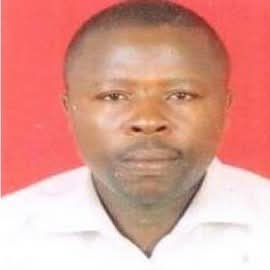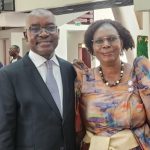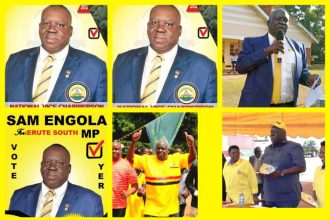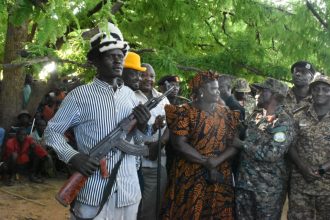If your voters lose appetite for sugar, salt, and soap, then change the menu into something like music in order to grab their attention during election time. In the 1984 General Elections, President Mobutu of Zaire scored 99% simply because of Franco’s music titled “Mobutu the Best Candidate.”
In Uganda, ministers are better dancers, and we hope this doesn’t interfere with the actual roles they are to execute while in office. They should be good at policy formulation as opposed to dancing strokes. Of late, Ugandan politicians are carefully studying the true demands of their voters.
I have seen old political contenders like General Moses Ali or Hon. Mathias Kassaija using some sort of antiquated strokes to woo voters to their side. In the past, winning an election was about a very good wallet; however, currently, besides cash, you need good dancing strokes too.
Music will one day sweep away the idea of giving physiological needs such as salt and sugar to voters. Voters will one day be swayed by just good dancing strokes. I recall in 2017, just from nowhere, Bobi Wine arrived on the political stage and captured serious attention from ghetto voters.
Music as a political tool for mobilization and attraction of voters is not restricted to Uganda. For example, in the 1980s, when the Congolese Maestro Franco Luambo sang for President Mobutu Sese Seko during the 1984 General Elections, Mobutu got 99% in the elections. “Candidat Mobutu Na Biso,” or “Mobutu the Best Candidate for Zaire,” was a very moving political hit for the Congolese strongman, and it did political wonders. Thus, if used correctly, music is very magnetic and can attract millions of citizens to one’s cause.
President Museveni, in his formative days of the National Resistance Movement, was praised as a man who relied on ideology in governing his people, while Professor Tandon and Prof. Nabudere had different estimations of Museveni then. Prof. Mahmood Mamdani and others, in their texts under UFAHAMU, “Read the Rise and Fall of Philosopher Kings in East Africa,” heap a lot of praise on Mr. Museveni as the best intellectual on the African continent. Many pieces to his name, such as “Fanon’s Theory of Violence and its Verification in Liberated Mozambique” and “Sowing the Master Seed,” validate his status as a serious scholar engaged in political activism and state governance.
However, of recent, the president appears to have abandoned this narrative for music, especially as many of his opponents like Bobi Wine, Mao, and Besigye are using music to deplete his base. To counter the influence of other political competitors who were using music to grab the attention of his voters, President Museveni went on a rampage, releasing hit after hit, beginning with “Another Rap,” then “Mpekoni,” which song depicts wild animals destroying crops, etc., and the latest being “Paka Rubale alerting Kwezi,” which was composed a few years back towards the eve of the 2021 General Elections. The “Mpekoni” or “Nkoni” (the stick) may have been a euphemism or metaphor for a gun or some other metal, using it to fend off political opponents determined to grab his throne using various means. With the 2026 General Elections less than 200 days away, Museveni may again be planning to release another hit to spice up his supporters.
Col. Kizza Besigye restrained himself to dancing instead of composing any music of his own, just raising his head a notch higher as he enjoyed music from his fans, many singing for him opposition-leaning songs like “Dakitari” by the late Kisakye and “Fungua Barabara Besigye Amengia,” or “Besigye has arrived, clear the bus off the road.” Col. Besigye has not yet dropped any political hit; perhaps, since he has a lot of free time in Luzira, he could be cooking something for his voters under his new party, the PPF.
Whereas music is good in promoting one’s political message and access to a relatively large audience, many have had problems in crafting political messages in a musical way. In Zaire, singer Franco Luambo, who was on record as a very close buddy of President Mobutu, composed a song “Luvambo Ndoki,” alleging that there was a witch who had just arrived in the village and was eating or engaged in acts of cannibalism, eating villagers or hanging them. President Mobutu ordered his locking up because, in essence, Luambo was actually referring to Mobutu as that witch in the village. Experts on music say if used correctly, music is the best tool in mobilizing masses to one’s cause. Remember the famous “Tubonga Nawe” by Chameleon and others; it worked massively for NRM.
Music’s intrusion in politics and revolutionary struggles is not a new phenomenon. The military, church, governments, and even the bereaved, including slaves transported across the Atlantic Ocean, used music variously. Governments, through national anthems, warm the audience with music. Many use it to get to their opponents by composing hits that are either denigrating or maligning others, while many compose and sing genuinely from their hearts, catapulting societal problems to the attention of the public through music.
Fela Kuti sang massive resistance songs and ended up creating his own republic. Sometimes music may create a false sense of status. In Fela Kuti’s republic, he had created a government within a government, and his namesake, General Olusegun Obasanjo, had no option but to pick him up and lock him up as well. In Uganda, the Ghetto President Bobi Wine had a state within a state, with military attires, ranks, and his crew were always saluting him and referring to him as His Excellency the Ghetto President. There was thus reasonable paraphernalia for statehood at the Ghetto headquarters, with a cabinet and state-appointed ministers, ambassadors appointed and perhaps not deployed. This gave him the motivation to join real politics to fulfill this utopian mindset. The government has come up with a new law against now wearing these military-related attires.
Bobi Wine is using music to mobilize city voters. As a young politician with a questionable purse, music was his tool of mobilization. Hits on the infamous city hall executive were released and enjoyed massive airplay. “Tugambile Ku Jenipher” in reference to Jennifer Musisi, then the executive head at the city hall, who was using all means to clean the city and rid it of vendors who were a problem in the policy protocols of KCCA. Other hits were “Elections or votes should not divide us,” and cajoling the police to desist from violence, reminding them that he was fighting for them and without any state authority, he had also “increased their salary from where it was to 1,000,000/= per month,” another “kiwani” pay raise.
President Museveni openly countered this personally and through his selected agents like Kusasira and Gagamela boss Bebe Cool and others. Many musicians were thus quickly drafted and assigned state/party responsibilities, placing them a notch higher than the Ghetto team. Many people who are very familiar with happening places in the city say Kampala was booming with music and money. Many deserted the ghetto cause; the likes of Mark Bugembe and Full Figure were now respected dignitaries, secured by either police or military escorts, ready to mobilize support for the party, courting their comrades in downtrodden areas to embrace NRM. This is how NRM was able to mobilize, relying on music. President Museveni released considerable hits mainly appealing to the youths to embrace the cause, and it indeed paid off. To stamp his feet on the political scene further, he needs to continue that line of music; it is worthy taking since many have lost taste for ideology to music.
Politicians now use music to push their political cause instead of ideology. Music will lead voters to the ballot booth, but if your compatriots lose taste for ideology, you change the menu or change the tune as well, and I think that is why many politicians are going musical to also protect their base.
Steven Masiga is a legal scholar from Mbale. Tel: 0706655811.




















